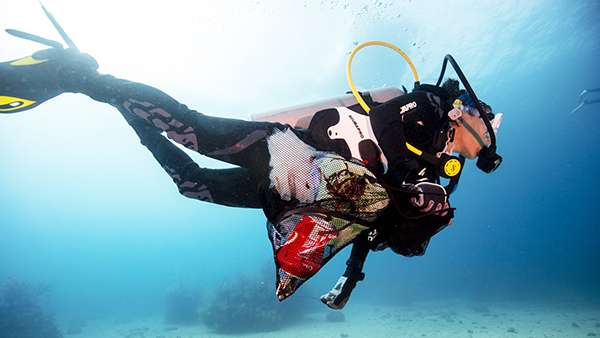Diving against debris ahead of NSW plastic ban

With NSW banning more single-use plastics from 1st November, citizen science scuba divers and snorkelers participated in a community effort over the weekend - Dive Against Debris - to clean up Sydney Harbour and highlight exactly why the bans are needed.
With Sydney Harbour choking on plastic, the Dive Against Debris event at Manly Cove saw dozens of concerned citizens don scuba gear and snorkels before heading below the surface to collect plastic waste and debris from Sydney Harbour. They were joined by Minister for Environment James Griffin who noted the ban on single-use plastics is just the beginning of a massive shift away from single-use plastics in NSW.
Dive Against Debris was founded in 1995 by Dive Centre Manly’s Richard Nicholls and has grown into the world’s largest Citizen Science marine project.
Now thousands of PADI dive centres regularly conduct underwater plastic clean-ups across the globe, with an estimated 250,000 divers worldwide gathering important data about the scope of the plastic pollution problem.
“Sydney Harbour is choking on plastic so it’s absolutely fantastic that the NSW Government is banning many single-use plastics,” Nicholls said.
“Marine mammals and fish are dying through plastic ingestion and entanglement, and items are breaking down into microplastics that end up in the human food chain. It’s shocking and we have to stop it.”
Minister Griffin advised “In June, we banned lightweight single-use plastic bags and from 1st November, we’re banning some of the most commonly littered single-use plastic items, including cutlery, plates, bowls, straws, and polystyrene food ware.
“About 95% of the litter on beaches and waterways comes from suburban streets, and single-use plastic items and packaging make up two thirds of all litter in NSW.
“We know from Australian Microplastic Assessment Project (AUSMAPlaunch) data that Manly Cove is among the worst beaches in the country for microplastic pollution, with research finding more than 850 pieces of microplastic per square metre.
“This is exactly why we must end our reliance on single-use plastic, and why the NSW bans are critical for changing behaviour and improving the state of our environment for the benefit of biodiversity and future generations.”
From 1st November, the NSW Government is banning single-use items including:
- plastic straws, stirrers, cutlery, chopsticks, plates, bowls and cotton buds
- food ware and cups made from expanded polystyrene
- rinse-off personal care products containing plastic microbeads.
This comes after lightweight single-use plastic bags were banned from 1st June.
The NSW Government bans will prevent almost 2.7 billion items of plastic litter from entering the environment in the State over the next 20 years.
Since February, the National Retail Association (NRA) has, on behalf of the NSW Government, been providing education and support to more than 40,000 businesses and community organisations around the State to implement the changes.
Educational material and in-person advice has also been provided in more than 15 different languages to support business owners and communities with diverse backgrounds.
The NSW Government has partnered with Great Plastic Rescue to collect excess stock from wholesalers, distributors, retailers, businesses and not-for-profits for recycling and remanufacturing into new items.
In September, the NSW Government launched the Stop it and Swap it advertising campaign, featuring shocking images of plastic pollution in the ocean and a turtle choking on a plastic bag, as an important reminder about why the state is banning certain single-use plastics.
For more information about the NSW Government’s single use plastic bans, visit the website mysocialpinpoint.com.au/plastics-ban-nsw
Image. Credit PADI
Related Articles
23rd October 2022 - Australian Retailers Association concerned by missed opportunity to establish national framework for single-use plastics
8th October 2022 - Seabin Foundation launches world-first microplastics lab at Australian National Maritime Museum
1st October 2022 - Single-use plastic cups for cold drinks banned in Western Australia from today
23rd September 2022 - NSW Government launches confronting new campaign ahead of plastic ban
9th September 2022 - European Commission move to restrict microplastic use set to impact infill used in synthetic turf systems
25th August 2022 - Darwin’s hospitality venues and vendors join Plastic Free NT program
29th July 2022 - Looking to reduce plastic cup waste Adelaide Oval will now serve alcohol in cans
19th July 2022 - Taronga offers edible coffee cups for Plastic Free July
1st July 2022 - Green Music Australia among 17 organisations campaigning this Plastic Free July
1st July 2022 - Conservationists welcome Australian Government’s commitment to addressing plastic pollution
16th May 2022 - Belgravia Leisure explains move away from single-use plastics
14th April 2022 - Western Australian hospitality venues offered help in transition to becoming plastic free
22nd March 2022 - Federal Government invests $60 million in recycling - but is it enough to stem the tide of plastic pollution?
10th March 2022 - ACT Government’s single-use plastics ban expanded to include Manuka Oval and GIO Stadium
3rd March 2022 - AMCS considers UN agreement as vital for tackling plastic pollution in Australia’s wildest places
22nd February 2022 - 40,000 businesses across NSW to receive extra help in transitioning away from single-use plastics
14th September 2021 - Australian Government declares its support for legally binding global plastics treaty
14th June 2021 - NSW and Western Australian Governments announce new plastic bans
1st April 2021 - Legislation passed for phasing out single-use plastics in ACT
